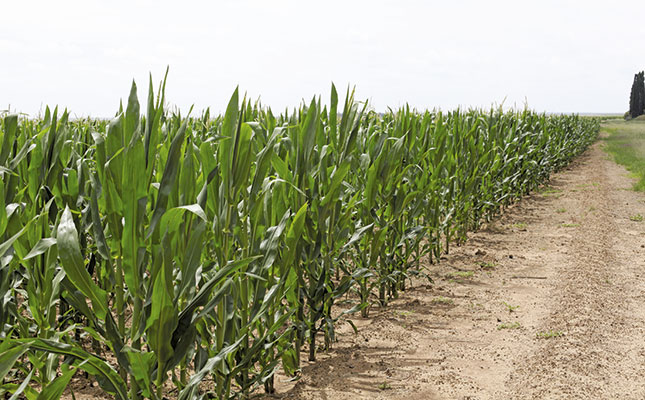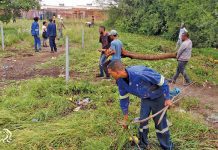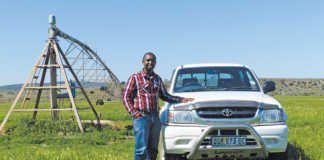
In 2013, a group of unemployed young people living in the Ngwathe township in the Free State’s Edenville district decided to form a farming co-op aimed at creating work for themselves and others in their community. This was the beginning of the Edenville Farming Projects and Cooperative (EFPC).
READ:Dr Dave Cooper at the frontline of rhino poaching
The group comprises Petrus Maloka, Molefi Mofokeng, John Mosito, Nelson Lephuti, Nketile Mokhaneli, Dimakatso Makhanya, Sebongile Mkhwanazi and Elias Mpondo, all of whom grew up together, attended the same school and now attend the same church.
After forming the co-op, the group approached their municipality and requested land. They were allocated 385ha, suitable for livestock and crops, on a ten-year contract. “If you come with a positive idea, government will assist you,” says Petrus.
Vincent Khoase, regional manager for the Ngwatho Municipality, explains: “I received the EFPC’s application through the local economic development office. There are a lot of applications from this office, but I realised this group was committed; they had courage and passion for their work. There are still no guarantees, however. It often happens that we lease land and then it isn’t developed.”
The lease was awarded to the group on condition that their progress was inspected annually; no development means cancellation of the lease. “Council came with the resolution that we would lease to people who wanted to develop communities. We have to assist them in terms of capacity,” Vincent says.
More assistance
In addition to the municipality, the group also receive assistance from Piet Mothepu, who has farmed cattle for almost 20 years. The group’s members see him as a mentor and attribute much of their success to his assistance. He is now also part of the EFPC.
The group were also fortunate to form a partnership with the Rietfontein Group, owned by Lourens Bibbey, who covered the production costs for white maize and planted the EFPC’s first crop on 22 December 2015. He used Pioneer 2961 on 368ha, and applied a standard pest control programme on the land. The group intended to plant in November, but was delayed by the drought.
Lourens, who runs a mixed farming operation of crops, sheep and a cattle feedlot in Frankfort, is involved in similar projects throughout Mpumalanga and the Free State. He trains developing farmers until they have enough knowledge and capital to operate on their own. With his assistance, as well as progress records over five years, these farmers may be able to access financing more easily.
“We want to expand our operations, but there isn’t land available. A partnership was the logical step,” Lourens says of his involvement with the EFPC. With land in the area selling for nearly R20 000/ ha, and the risk involved in buying land, partnerships are wise, according to him.
“The Rietfontein Groups supplies everything and share profits with EFPC after harvest. It helps both parties – it’s a win-win.”
In addition to covering production costs and planting, Lourens also helps to buy and apply fertiliser the group’s land. Fertiliser needs are determined through regular soil analysis. Because it had been lying fallow for some time, conservation agriculture practices are appropriate for the maize land.
The group is keen to utilise the pasture on the land, and is considering purchasing cattle with its first profits, under the financial guidance of Lourens. “We already have a market with Sernick nearby. We can deliver straight to their abattoir and create more jobs this way,” Petrus says.
Independence in five years
The group intends to be self-sufficient by 2020 and are studying and working towards this goal. They are attending workshops to increase their knowledge of maize production, and have also attended practical courses on soya, wheat and sunflower production. They have found all these courses to be greatly beneficial.
“We’re on a learning curve,” says Molefi Mofokeng, spokesperson for the group. “We have to have a partnership for five years and thereafter want to stand on our own feet. With the little we get from the current partnership, we’ll cover some of the resource costs. However, we still need assistance from government.”
Several visiting commercial farmers have been highly impressed with the quality of maize that the group were able to produce in such a bad year. Nick Serfontein, owner of Sernick, said that the EFPC had some of the best maize in the Free State.
These visits and opinions are important for the future of the group, its members emphasise, as commercial farmers realise that the EFPC is serious about farming, and consequently are more likely to lend a hand.
Turning to the drought, co-op member Molefi says that although the rain was insufficient for an above-average harvest, the group should be able to harvest something. “We’re hoping for a harvest of between 7t/ha and 8t/ha, but we need rain. We won’t start counting our money before it’s in our pocket,” he says.
The co-op aims to deliver its first harvest to a nearby AFGRI silo this year. The group’s members report a shift in their way of thinking. “I’m now aware of the maize prices and check it daily on a mobile app. When I checked this morning it was R4 000/t. Maybe we can get more,” Molefi says.
Business plan
The group have prepared a clear business plan to assist them in applying for further assistance, but are realistic about their chances. “It’s very difficult to get grants. There are a lot of applicants and it takes time,” says Molefi.
Many potential donors have been approached and the group now await responses. The funding of co-ops is a sensitive issue as there is often group in-fighting, which deters investors. But, says Petrus, the EFPC is different. “We attend the same church. When there’s an issue, we come together and pray and put God’s will ahead of our own interests.
When we started, we selected one church and attend together.” All meetings begin with singing and prayer, after which farming matters are attended to.
Caring for the community
Assisting and uplifting their community and the Ngwathe township has always been a priority for the group. After the harvest, they intend allowing any members of the community who farm cattle to make use of their land’s stover – at no charge.
“We want to benefit the community. We come from this community. All our members are unemployed, so we know how difficult it is. But you have to endure difficulty first; most people form a co-op and want paying jobs tomorrow,” Petrus says.
Some members of the EFPC are part of a community works programme that helps to clean streets, churches and schools, as well as get involved in vegetable gardening.
Phone Petrus Maloka on 083 964 3181.
This article was originally published in the 15 April 2016 issue of Farmer’s Weekly.













